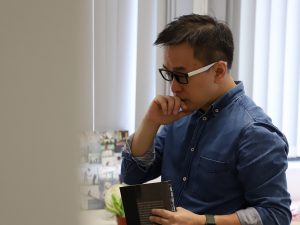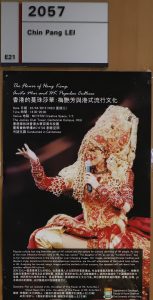Enter Lei Chin Pang’s office, and you will be greeted by a poster splashed across the door that reads‘The Flower of Hong Kong: Anita Mui and HK Popular Culture’, Keith Haring’s books and posters about Wong Kar-Wai’s films displayed on the bookshelves, as well as models of the cat-like robot Doraemon and Astro Boy on the desk. In a place brimming with pop elements, a copy of a book about Chiung Yao’s romance novels, written by the Taiwanese scholar and writer Lin Fangmei, seems to be an indispensable item. It is indispensable not only in Prof Lei’s office, but also in his journey through pop culture studies.
A Book that Opens Up a Window to Pop Culture Studies
In the 1990s, when pop novels were all the rage, Lei traversed breathlessly between different genres and authors: the fascinating sci-fi world created by Ni Cong, the chivalry and pure love which characterised Louise Cha’s novels, and the moving love stories written by Chiung Yao and Yi Shu. ‘I was so addicted to reading my parents had to scold me to make me put down the books for dinner. Even in class, I read secretly and just didn’t want to put them down. But it was not until after I went to Taiwan for college and bought this book analyzing Chiung Yao’s romance novels that I began to realise what I had thought was mere entertainment actually had a deeper meaning. This book opened up a window to a new understanding. It helped me understand the reason pop culture touches so many people’s hearts. It is because it resonates with our contemporary collective psyche. It is a cultural fabric of the modern society.’
In addition to being a faculty member at UM, Prof Lei holds several other roles, including editor-in-chief of NEW GEN Monthly, member of the Hong Kong Film Critics Society, news commentator of Macao Forum (a radio programme in Macao), and author of Invisible Macau: The Ignored City and Culture and other books. Recently, Prof Lei is writing a book in which he analyses Hong Kong from the perspective of the late singer and actress Anita Mui Yim-fong, which he thinks is a nice echo of the book on Chiung Yao’s romance novels he happened upon 20 years ago. He explains, ‘I feel what I am doing now is a continuation of this book’s influence on me. I am writing about my own era with an angle borrowed from this book, and I am writing about contemporary society through the pop culture elements of my time.’ Lei says that his reading, research and writing experiences over the past two decades have been a process of self-discovery that connects to the core of his being. ‘Many of the books I read and research studies I conducted later on seemed to point to the answer of the question of why I like these cultural elements and how they have nourished my life in a lasting way.’
A Mirror of Reality
‘It is unlikely that someone who grew up in Macao, especially during those times, could have foreseen what is now known as “pop culture” could become a subject of serious study. I think this book helped me gain a better understanding of Chiung Yao and Taiwan, and cultivated in me an early interest in cultural studies.’With a background in journalism and Chinese literature, Lei is good at analysing the social undertones of a text from the perspective of cultural studies. He explains, ‘For instance, when you read Yi Shu and Chiung Yao, you can immediately tell the difference between the two. But only upon closer examination will you uncover the root cause of this difference: a difference in the social environment and climate. Set in a capitalist society, Yi Shu’s novels emphasise the importance of “bread”; whereas Chiung Yao, living in a society where economic growth was relatively slow, created a more dreamy world of romance in which lovers are determined to stay together against all odds until death do them part.’
For Lei, a good book is a like a window, where the view outside is lost on those who hurry by . Only when one ventures beyond the window will he see the big world out there. He believes that Lin Fangmei’ s book functions much like the window that invites him to explore the world beyond, which is exactly what he has been doing over the past 20 years.
A Time Machine that Transports Him across Different Periods
Born and raised in Macao, Lei didn’t realise how little he understood Taiwan until he relocated there for college.‘When I got there I learned that the martial law was lifted not long ago, and that there were aboriginal inhabitants in Taiwan. It was not until after I started reading Lin’s book on Chiung Yao’s romance novels that I realised how those unrealistic love stories may have been spawned by the era in which the author lived.’ Lei explains that books are like time machines that transport him across different time periods. Extensive reading has broadened his mind and reveals the richness of a given time period, which in turn deepens his studies of pop culture. ‘In my research, I often ask myself: What are the cultural backgrounds of the pop elements? How have they influenced me? ’
He adds, ‘Reading nurtures your imagination. For instance, when you read The Return of Condor Heroes by Louis Cha, you can’t help but try to imagine what the Little Dragon Maiden looks like. But when you watch a TV drama adapted from the novel, it leaves no room for imagination. Imagination is so precious. It makes you feel as though you were there in the story.’
Source: My UM


